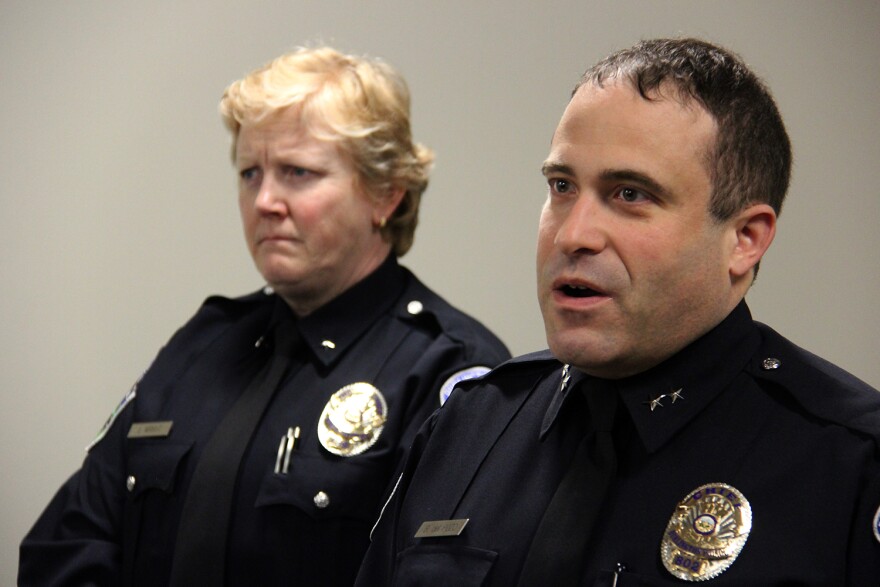Burlington Police Chief Brandon del Pozo says the recent beating death of a transgender man living in a homeless camp near Burlington's Barge Canal may have been the result of "petty" fighting between camp factions rather than motivated by bias.
Burlington police announced Friday the arrest of four people charged with murdering of Amos Beede, 38. Beede was allegedly beaten by the four late last month, and he later died. Police identified his alleged attackers as people living in a homeless camp in Burlington.
The four suspects were caught after Burlington police coordinated with authorities in San Diego, according to del Pozo.
"The four people who we suspected for the crime fled through New York by car down to New Mexico shortly after the incident. One of them was arrested for an act of domestic violence against the other in Roswell [a city in New Mexico]," del Pozo says. "They were released with a court date prior to us realizing they were down there, and the New Mexico police realizing they were wanted, and then we saw some license plate reads on the vehicle that indicated to us that it was headed along the border with Mexico, but not leaving the country, headed towards San Diego. So we coordinated with the San Diego police and we arrested them."
Del Pozo says there will be an extradition process, and the goal is to return the suspects to Vermont to have them stand trial for second-degree murder.

Originally, police thought the brutal beating that killed Beede was possibly motivated by bias, due to Beede's identification as a transgender man. And del Pozo says the department is still not ruling that possibility out.
"This was done with with feet and hands, not with a weapon. It was a brutal beating. It was sustained. And whenever somebody is, for example, transgender, or of a particular race or orientation, they're more vulnerable than your average person. We don't want to rule out the possibility that there was a bias motivation. Especially for something that is as brutal as this," he says.
But, del Pozo says, there are also indications that infighting at the homeless camp may have incited violence.
"All indications are that there were two camps within the encampment, a north and a south camp, that were warring with each other over pretty petty stuff," he says. "But it did evolve over the preceding days – one camp smearing feces on another camp's tent. Amos Beede was alleged to have poured year and on one of the attacker's tents in retaliation, and it escalated into a physical fight. Everything we know suggests that this was the motivation, rather than bias."
"All indications are that there were two camps within the encampment ... that were warring with each other over pretty petty stuff." - Burlington Police Chief Brandon del Pozo
The murder has shed light on Burlington's homeless encampments, which are populated mainly in the summer months, when it's easy to live outside in Vermont – and are also more difficult to police, del Pozo says.
"Once the weather gets good, there's a populous here that's inclined to not go to a shelter, because you can't use drugs or drink easily, but rather just camp out of the way on private or public land," del Pozo says. "They're no safe way for a person to live, and they're very, very hard to police. We don't normally just go walking through the woods looking for encampments, just for the sake of seeing what's going on there. So we get called there usually when incidents happen."
Del Pozo adds: "There's also a sensibility among Burlingtonians, and Vermonters, to some extent, that is compassionate towards people that don't have shelter."
Burlington Mayor MiroWeinberger has suggested that the city is going to try to clear out the camp where the alleged murder took place, near the Barge Canal in Burlington, because it's it's illegal and its inhabitants are trespassing by staying there.
"I'd prefer to police a city where the expectation is, if you're homeless and you come here, you'll be expected to access services that you can take advantage of, but that requires behavior that's not dangerous or anti-social."
When asked what the city's long-term strategy is for supporting those who live in the encampments, del Pozo says the de-facto question is one of addressing homelessness in Burlington and Vermont.
"There's no easy answer to that," he says. "I mean, the answer is not, however, to have unsupervised, unlawful camps just sprouting up. I think the city is on firm ground because if they were to eliminate this camp, people would have a place to go. They would be able to go to shelters."
But, del Pozo says, they would have to make the commitment not to drink and do drugs while they were in the shelter.
"I'd prefer to police a city where the expectation is, if you're homeless and you come here, you'll be expected to access services that you can take advantage of, but that requires behavior that's not dangerous or anti-social."




